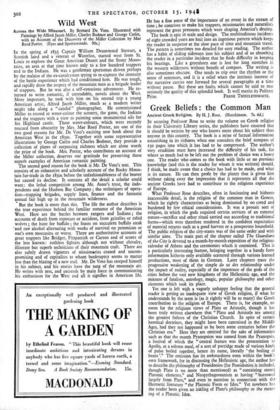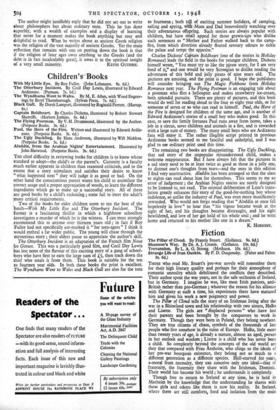Greek Beliefs : the Common Man
Ancient Greek Religion. By H. J. Rose. (Hutchinson. 7s. 6d.)
IN securing Professor Rose to write the volume on Greek religion in their University Library series, the publishers have ensured that it should be written by one who knows more about his subject than anyone in this country. The book is a mine of factual information astonishing in its richness when one considers the brief compass of I5o pages into which it has had to be compressed. The author's very erudition must have increased the difficulty of his task, for where so much had to be left out the problem of choice was a heavy one. The reader who comes to the book with little or no previous knowledge (and this is the reader for whom it was written) should, I think, be made aware that a choice has had to be made, and what is its nature. He can then profit by the plenty that is given him without taking away the impression that it represents all that the ancient Greeks have had to contribute to the religious experience of Europe.
What Professor Rose describes, often in fascinating and hitherto inaccessible detail, is the religion of the common man in Greece, which he rightly characterises as being dominated by no creed and burdened by few ethical considerations. It was a prosaic sort of religion, in which the gods required certain services of an external nature—sacrifice and other ritual carried out according to traditional forms—which were therefore rendered in the confident expectation of material returns such as a good harvest or a prosperous household. The public religion of the city-states was of the same order and with similar aims. The main part of the chapter called The Guardians of the City is devoted to a month-by-month exposition of the religious calendar of Athens and the ceremonies which it contained. This is a particularly interesting feature, bringing together in a handy form information hitherto only available scattered through various learned productions, most of them in German. Later chapters trace the progressive weakening of the simple do ut des relationship under the impact of reality, especially of the impotence of the gods of the cities before the vast new kingdoms of the Hellenistic age, and the mixture of fatalism, astrology, magic, popular philosophy and other elements which took its place.
Yet one is left with a vaguely unhappy feeling that the general reader is getting an inadequate view of Greek religion, if what he understands by the term is (as it rightly will be to many) the Greek contribution to the religion of Europe. There is, for example, no room for the religious views of Plato or Aristotle, though it has been truly written elsewhere that " Plato and Aristotle are among the greatest fathers of the Christian Church. In spite of certain heretical doctrines, they might have been canonised in the Middle Ages, had they not happened to be born some centuries before the Christian era." Here they are omitted for the sake of information such as that the month Pyanopsion was named from the Pyanopsia, a festival of which the " central feature was the presentation to Apollo, at a solemn meal, of a sort of porridge made of various kinds of pulse boiled together, hence its name, literally ' the boiling of beans '." The omission has its awkwardness even within the book's own framework, for in discussing the Hellenistic age, the author has to describe the philosophy of Poseidonios (for Poseidonios is included, though Plato is no more than mentioned) as "containing strong Platonic elements," and Neopythagoreanism as having " borrowed largely from Plato," and even to mention in connection with the Hermetic literature "the Platonic Form or Idea." Yet nowhere has the reader been given an inkling of Plato's philosophy or the mean- ing of a Platonic Idea.
The author might justifiably reply that he did not set out to write about philosophers but about ordinary men. This he has done superbly, with a wealth of examples and a display of learning that never for a moment makes the book anything but easy and delightful to read. What he writes about as ancient Greek religion was the religion of the vast majority of ancient Greeks. Yet the main reflection that remains with one on putting down the book is that if the religion of later ages owes anything to the Greeks (and the debt is in fact incalculably great), it owes it to the spiritual insight



































 Previous page
Previous page